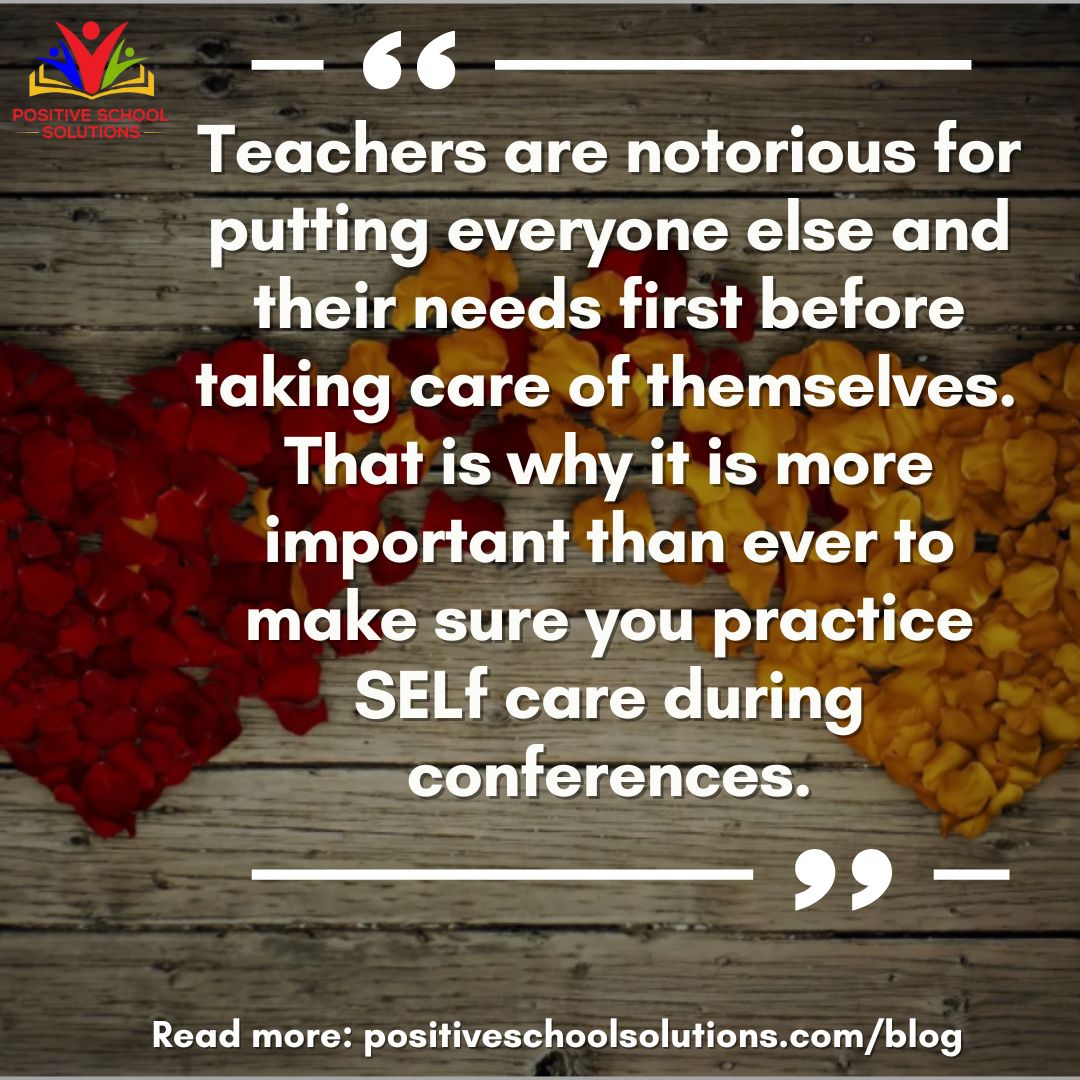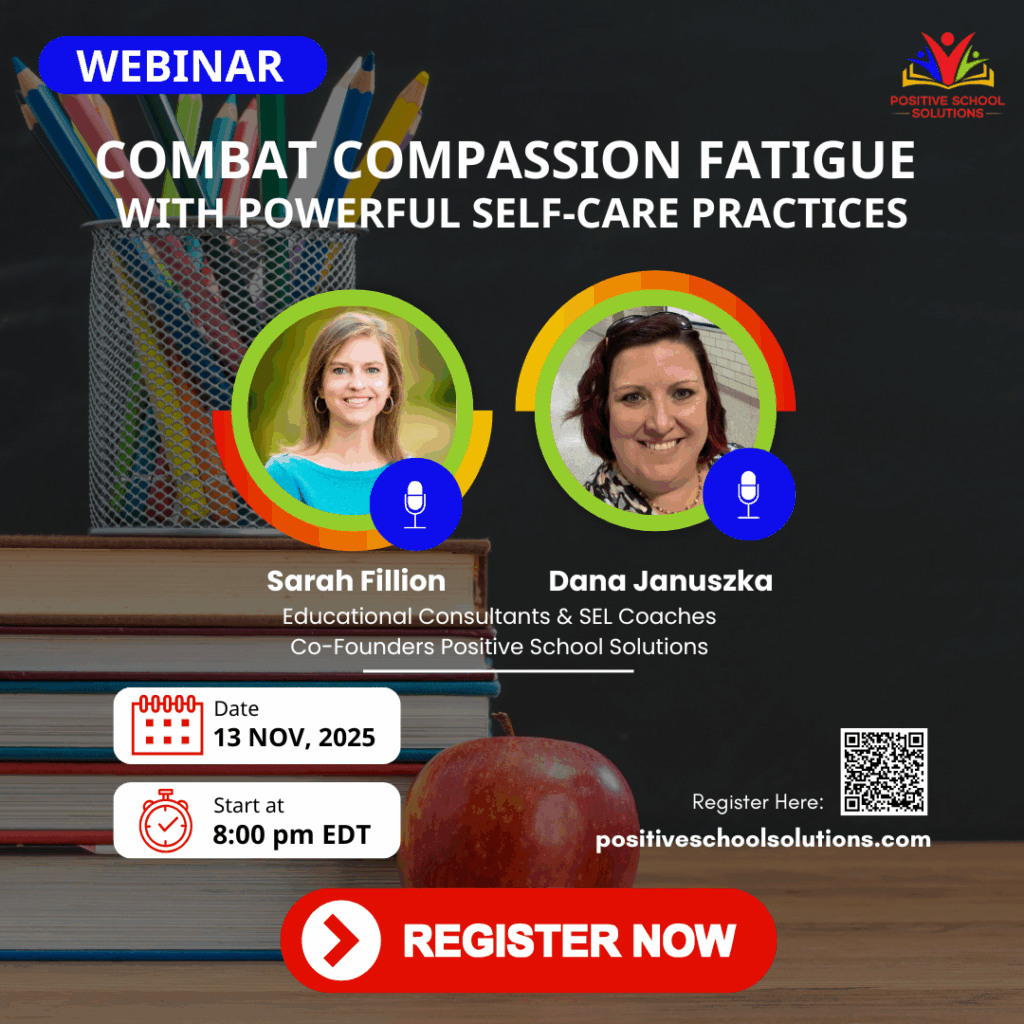
Conferences are demanding, and it always seems that the week before and during conferences are personally hectic for educators as well. Even without conferences, teachers are notorious for putting everyone else and their needs first before taking care of themselves. That is why it is more important than ever to make sure you practice SELf care during conferences – think about the whole ‘put your mask on before helping others’ safety protocol recited every time you are on a plane. That sentiment is true, especially during the weeks around conferences! If you want to be able to give your best to families, converse about progress and next steps for students, and create a supportive learning environment for all – you must be in the best frame of mind possible. Below we’ve aligned the five competencies of SEL from CASEL to our tips for 5 ways to incorporate SELf care into your daily practices during conferences.
SELF-AWARENESS
Identifying one’s emotions – With the fast pace of conferences, both during preparation and the back-to-back race through them, it is easy to recognize a feeling and push it aside, feeling that there isn’t enough time in the schedule for that emotion.
One way we can express self-care for ourselves is by taking time to pause and reflect, name the emotion you were (or even better, are) feeling, and acknowledge it. Permitting ourselves the opportunity to pause can be the hardest aspect, but it can lead to fantastic results! Taking that time to identify and name the feeling can shift the power. Instead of pushing it aside and letting it linger, we diminish the emotion by doing a brief analysis and being able to take back the power that it was usurping from our energy and focus.
This practice can be quick and done in any place – you don’t have to wait to be seated in a yoga position (though you can!) or silent surroundings. The important aspect is to remember to do it. Pause, reflect, name, and acknowledge. As you acknowledge it, think about why you were feeling that way and then how you want to feel.
For example, I am agitated – I am not able to focus on the task at hand. I pause and reflect – I am feeling frustrated because I had planned on preparing for 3 conferences in one hour and I am not even through my first one. I acknowledge that part of my frustration is due to the fact that I didn’t have all of the artifacts for my students ready to go but instead had to spend the first 25 minutes organizing the materials and am now ready to go; so I should be able to do the next two conferences in substantially less time.
SELF-MANAGEMENT
Using planning and organizational skills – While identifying your emotions can be done at any time, this next tip is all about setting time aside. As you look at your week for preparing and delivering conferences, schedule time for yourself and stick to it. What helps you refuel and re-energize? Reading a book, watching a movie, hanging out with friends, going for a walk, taking a group exercise class, meditating, or something else? Plan an activity that makes you feel your best (both your present and future self) and will keep the pep in your step needed to successfully navigate conferences.
SOCIAL AWARENESS
Understanding and expressing gratitude – We’ve heard this before and many of us have tried and really felt better by doing it, but a reminder and challenge can be helpful at this busy time of year to express gratitude. Spend some time reflecting (write in a journal, post on social media, or simply take a moment to think) each day about 3 things you are grateful for. When expressions of gratitude are for simple, everyday occurrences, we’re more likely to feel grateful in the future when we experience the same thing.
For example, when expressing gratitude, you might conjure up how amazing an element of a meal was (picture perfect vine-ripened tomatoes or a piece of chocolate that was superior). Spending the time expressing gratitude for that delicious meal you ate means you are more likely to remember that appreciate the flavors in your next meal more – the freshness will pop or the sweetness will make your mouth water. Taking time to recall all of the good that surrounds us can make sure that our mental game is ready for conferences so that we can set a positive tone for the families we converse with.
RELATIONSHIP SKILLS
Seeking or offering support and help when needed – We know that humans are social beings and, as educators, we are more likely to carry our own burdens solo instead of asking for help. During conferences, take time to check in on your colleagues and friends. A quick text message or call to say ‘Hey, just checking on you. How’s it going?’ or to share successes can help you both focus on the positives or offer a listening ear.
Additionally, know that it is ok to be truthful in your sharing with others – simply sharing what is weighing us down can help us feel better. You might ask a friend for 10 minutes to chat and start the conversation with, “I need someone to listen to me as I share something on my mind. This isn’t anything that needs to be problem-solved, I just need a friend right now.” Starting the conversation off that way lets your friend know what their role is and how to best support you. And, at the end of the conversation, you’ll most likely be feeling a lot less stressed and worried about what was weighing heavy on your mind. Taking time to seek and offer support to others during conferences can help bolster spirits, as we feel connected and cared for by others.
RESPONSIBLE DECISION MAKING
Demonstrating curiosity and open-mindedness – The final tip for SELf care during conferences is to care for yourself with the information you take in. Whether it is personal or work related, when facts or perspectives that differ from your own are shared with you, remain curious and open-minded. You may do this by pausing the conversation to collect more information, examine the shared perspective to see where similarities and differences exist, or reflect on the experiences and information that formed your own perspective. Through taking the time to be curious and open-minded, you care for yourself by evaluating information and broadening your own perspective.
These SELf care strategies can be, and should be, applied to life at all times, not just around preparation and execution of conferences. Attending to SELf care will help you create a sense of well-being, which will translate into the partnerships you establish with caregivers. By employing SELf care practices, you model for others the idea that taking care of yourself is critical to an optimal learning experience.
If you’ve ever felt like you’re just surviving, it’s time for a change. Teaching doesn’t have to be a constant struggle—it can be a source of joy, energy, and purpose. The Lesson Plan for Life Course is here to help you take that first step toward upspiraling your life.
Written by Sarah Fillion & Dana Januszka for Positive School Solutions 2020


